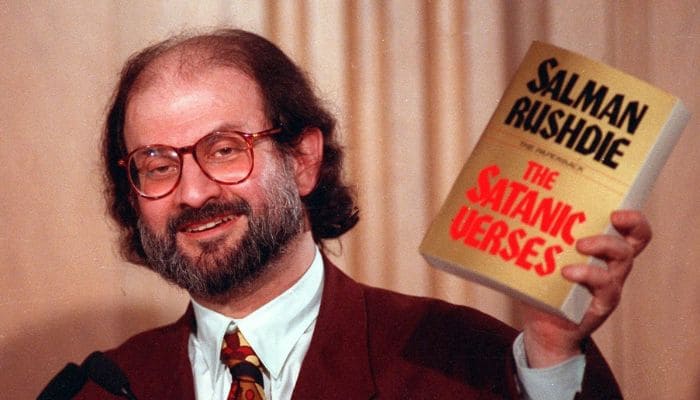The world of literature has not yet recovered from the shock surrounding the terror attack on novelist Salman Rushdie on August 12 this year.
The author of ‘The Satanic Verses’ received multiple stab wounds after he was attacked by a man during an event at the Chautauqua Institution in western New York. The accused, identified as a 24-year-old Islamist named Hadi Matar, jumped onto the stage and attacked the novelist with a knife.
Although Rushdie is said to be recovering well, it is worth noting that his life was under threat since the publication of ‘The Satanic Verses’ in 1988, as several fatwas and bounties were announced against him by Islamists for the book.
While it is well known that Iran’s first Supreme Leader Ayatollah Khomeini called upon all Muslims to kill Salman Rushdie, Pakistanis enacted it out in a bizarre film named ‘International Gorillay.’
Flying Quran kills Salman Rushdie with electric rays
The contentious movie, released in 1990, featured actor Afzaal Ahmad in the role of Salman Rushdie. The novelist’s character has been portrayed as that of a criminal mastermind, leading an international conspiracy to destroy Islam.
As expected, Rushdie was shown to have the support of ‘Yahudi (Jewish)’ Israeli army. The story highlighted the characters of three ‘Muslim’ brothers who decide to go to the Philippines, where Rushdie had been hiding with his Israeli henchmen.
The film showed that the three men were aghast at the publication of ‘The Satanic Verses’ and wanted to restore ‘world peace’ by killing Salman Rushdie. A video clip from the film is now doing the rounds of the internet.
In the final scene, Rushdie was shown to be surrounded by the three Muslim men (who happen to be the International Gorillay). Three giant copies of the Holy Quran were also seen flying in the sky and punishing the novelist for committing blasphemy.
“Look, this is the Book, you non-Believer,” said one of the brothers. Another added, “Concede to the fact that this is the Book to which we have no doubt.” The last of three men announced, “Concede, Satan, that God Himself has vowed to protect the holy Book.”
A woman, who was present at the scene, warned, “Today, your death is going to be a warning for all non-believers.” The movie ended with electric rays emitting from the 3 copies of the Quran and burning Rushdie for supposedly conspiring against Islam.
Salman Rushdie appealed to lift Ban on ‘International Gorillay’ in the UK
As per a report by the New York Times, the Board of Film Classification imposed a ban on the distribution of ‘International Gorillay’s videocassettes in Britain in July 1990.
“The classification board denied ‘International Gorillay’ a certificate that would allow people over 18 to rent it for home viewing because, it said, the film constituted criminal libel against Mr. Rushdie,” the report underlined.
However, the decision was challenged by none other than Salman Rushdie. This was despite the fact that the movie portrayed his murder with electric bolts from the Holy Quran. The novelist appealed that he did not support censorship of any kind.
Although the lawyer representing the Britain Board of Film Classification pointed out that the film had the potential to inflame ‘audience susceptible to such influences’, the author of ‘The Satanic Verses’ argued otherwise.
He stated, “As a writer, I am opposed in principle to the use of the archaic criminal laws of blasphemy, sedition and criminal libel against creative works, even in the case of a film which quite plainly vilifies me.”
“Censorship is usually counterproductive and can actually exacerbate the risks which it seeks to reduce,” he stated, adding that the audience will realise that the film is an incompetent piece of trash. As a result, Britain’s Video Appeals Committee lifted the ban on the home distribution of the film.
When Shekhar Gupta watched the film in Pakistan
In his July 1st segment of ‘Cut the Clutter’, Shekhar Gupta narrated how he was in Pakistan at the time of the film’s release.
Given that ‘International Gorillay’ had a cast of top Pakistani actors such as Babra Sharif, Neeli and Javed Shaikh, he went to watch the film at the Nasheman cinema hall in Karachi city of Sindh province.
‘The Print’ Editor even wrote a review of the bizarre film in an article in India Today on June 15, 1990.
“In comes the Salman Rushdie look-alike – who some say is better looking than the original – spectacles resting on the bridge of his prominent nose. He accepts the challenge of destroying Islam despite the risk of facing death squads and being called “kutta” for the rest of the film,” Shekhar Gupta had written.
He continued, “Lightning. A clash of cymbals. The camera zeroes in on a sizeable derriere. Then an ample bosom. “Babra Sharif” shouts the audience even before the face comes on screen. Immediately, the lady breaks into a raunchy dance-in the course of which she changes her cabaret-type attire four times.”
“But just when it seems too late for divine intervention, copies of the holy book appear from all corners of the room and send out beams of electricity that electrocute Rushdie to the accompaniment of wild cheering. This in a city where the mother of the real Rushdie lives!” Shekhar Gupta described the climax of the movie in all earnest.
In the aftermath of the deadly attack on Salman Rushdie, several Islamists from Pakistan took to social media to celebrate the incident and hail the assailant as a ‘Ghazi.’
This article was originally published in Opindia on August 14, 2022.



